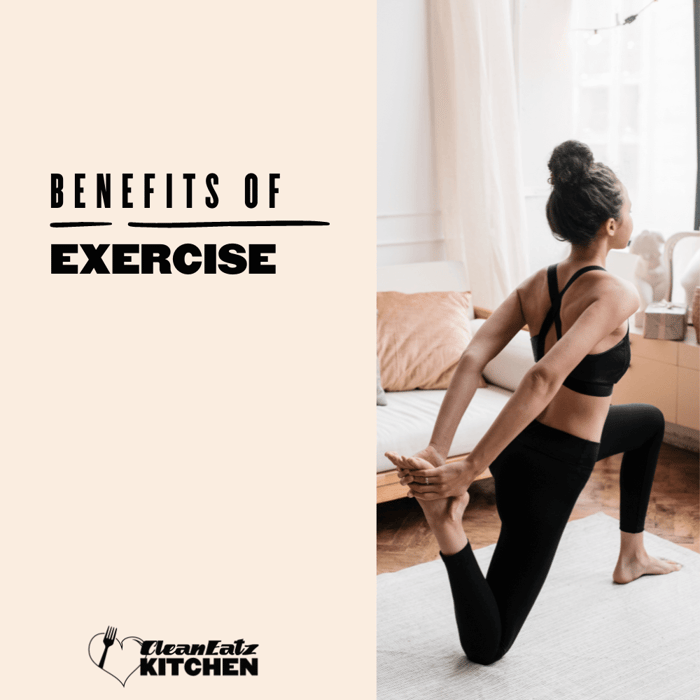The Ultimate Guide to Exercise Benefits: Science-Backed Health Benefits (2025)

Jason Nista
Exercises & Fitness
|
Weight Loss
|
Mental Health
|
Sleep
10/13/2025 8:41am
17 minute read
If there were a pill that could prevent chronic disease, improve mental health, boost brain function, and extend your lifespan, everyone would want it. That pill exists—and it's called exercise. Regular physical activity is one of the most powerful tools available for improving virtually every aspect of human health, backed by thousands of scientific studies.
This comprehensive guide explores the remarkable, science-backed ways exercise transforms your body and brain, from reducing dementia risk by 30-40%1 to improving depression symptoms more effectively than medication.2 We'll cover the latest 2024-2025 research on longevity, mental health, cancer prevention, weight management, and much more.
Table of Contents
- Physical Health Benefits
- Mental Health and Brain Benefits
- Weight Management and Metabolism
- Cancer Prevention and Survival
- Longevity and Healthy Aging
- How Much Exercise Do You Need?
- Getting Started and Staying Consistent
- Frequently Asked Questions
Physical Health Benefits of Exercise
Cardiovascular Health and Disease Prevention
Regular exercise strengthens your heart muscle, allowing it to pump blood more efficiently throughout your body. This improved cardiovascular function reduces resting heart rate, lowers blood pressure, and decreases the risk of heart disease by up to 35%.3 Exercise also improves circulation, helping deliver oxygen and nutrients to tissues while removing waste products more effectively.
Physical activity raises HDL (good) cholesterol while lowering LDL (bad) cholesterol and triglycerides, creating a healthier lipid profile that protects against arterial plaque buildup.4 This reduces stroke risk by approximately 27%, providing powerful protection for your cardiovascular system.
A groundbreaking 2024 study published in the journal Circulation found that adults who perform two to four times above the recommended amount of moderate physical activity have a 26% to 31% lower all-cause mortality and a 28% to 38% lower risk of cardiovascular disease mortality.5 Even better, meeting just the minimum recommended levels of activity can reduce cardiovascular disease mortality by 22% to 31%.
Metabolic Health and Diabetes Prevention
Exercise is a metabolic game-changer. It improves insulin sensitivity, helping your cells use glucose more effectively and reducing type 2 diabetes risk by 40-50%.6 During physical activity, your muscles can take up glucose without insulin, providing immediate blood sugar control benefits that last well beyond your workout.
Regular movement also increases your metabolic rate, helping you burn more calories both during activity and at rest. Strength training builds lean muscle mass, which burns more calories than fat tissue even when you're not exercising, creating a positive metabolic cycle that supports long-term health.
Musculoskeletal Strength and Bone Health
Weight-bearing and resistance exercises stimulate bone formation, increasing bone density and reducing osteoporosis risk. This is particularly crucial as we age, since stronger bones mean fewer fractures and greater independence in later life.
Exercise builds and maintains muscle mass, which naturally declines with age in a process called sarcopenia. Strength training can reverse this decline, improving functional strength for daily activities like climbing stairs, carrying groceries, and maintaining balance. Enhanced flexibility and balance from activities like yoga and tai chi reduce fall risk and improve overall mobility.7
Immune System Enhancement
Moderate exercise boosts immune function, increasing the production and circulation of white blood cells and antibodies. Regular exercisers experience 25-50% fewer sick days from common illnesses like colds and flu.8 Exercise also reduces chronic inflammation, which underlies many age-related diseases and contributes to overall health decline.
Mental Health and Cognitive Benefits
Depression and Anxiety Relief
One of the most powerful benefits of exercise is its effect on mental health. A landmark 2023 study published in the British Journal of Sports Medicine analyzed 97 reviews, 1,039 trials, and 128,119 participants, concluding that exercise is 1.5 times more effective than counseling or leading medications for managing depression and anxiety.2
Exercise triggers the release of endorphins, often called "feel-good" chemicals, which create natural feelings of euphoria and reduce pain perception. Physical activity also increases production of serotonin, dopamine, and norepinephrine—neurotransmitters that regulate mood and are often targeted by antidepressant medications.
The mental health benefits happen quickly. Exercise interventions that are 12 weeks or shorter are most effective at reducing mental health symptoms, and mood improvements can be felt immediately after just one workout session.2 A 2024 meta-analysis found that both aerobic exercise and resistance training improve depression and anxiety symptoms across all clinical populations, with higher intensity exercise producing greater improvements.9
Stress Reduction and Emotional Well-Being
Physical activity is a powerful stress reliever that reduces levels of stress hormones like cortisol and adrenaline. Exercise provides a healthy outlet for nervous energy and frustration while promoting relaxation through the release of tension held in muscles. Many people find that exercise provides valuable time for meditation, problem-solving, or simply clearing their minds.
Cognitive Function and Brain Health
Physical activity increases blood flow to the brain, delivering more oxygen and nutrients that support cognitive function. Exercise stimulates the production of brain-derived neurotrophic factor (BDNF), a protein that promotes the growth of new neurons and protects existing brain cells.10
Regular exercisers show improvements in memory, attention, processing speed, and executive function. These cognitive benefits are observed across all age groups, from children to older adults. Exercise can improve academic performance in students and work productivity in adults by enhancing concentration, creativity, and problem-solving abilities.
Dementia Prevention and Neuroprotection
Perhaps most remarkably, exercise reduces the risk of cognitive decline and dementia by 30-40%.1 A January 2025 study from UCL found that people who exercise throughout their lives have a better chance of avoiding dementia—even if they show signs of diseases like Alzheimer's.11 Being physically active, especially before the age of 50, is linked to a larger hippocampus (the area of the brain mainly responsible for memory).
Physical activity helps prevent age-related brain shrinkage, particularly in the hippocampus, the brain region crucial for memory. A 2024 analysis found that exercise-related physical activity relates to larger brain volumes, providing physical evidence of exercise's neuroprotective effects.12 Regular exercise also reduces the buildup of harmful proteins associated with Alzheimer's disease, potentially delaying or preventing the onset of symptoms.
The 2024 Lancet Commission on Dementia reported that 45% of dementia cases could potentially be prevented by addressing 14 modifiable risk factors, with physical inactivity being one of the most important.13
Sleep Quality Improvement
Exercise helps regulate circadian rhythms, making it easier to fall asleep and improving sleep quality. Physical activity increases time spent in deep sleep, the most restorative sleep phase. Better sleep, in turn, enhances mood, cognitive function, and physical recovery, creating a positive feedback loop. For optimal sleep benefits, aim to finish vigorous exercise at least 3-4 hours before bedtime.
Weight Management and Metabolism
Exercise plays an important role in weight management, though its effects are complex and work best when combined with a healthy diet. A December 2024 meta-analysis published in JAMA Network Open found that engaging in 30 minutes of aerobic exercise per week was associated with modest reductions in body weight, waist circumference, and body fat measures among adults with overweight or obesity.14
The study found that aerobic exercise at least 150 minutes per week was associated with clinically important reductions in waist circumference and body fat. Exercise at 150 to 300 minutes per week showed the greatest benefits for reducing adiposity measures.14
Beyond burning calories during activity, exercise helps preserve lean muscle mass during weight loss, which is critical for maintaining metabolic rate. The combination of cardio and strength training provides optimal body composition results. A 2023 study found that resistance training reduces lean mass loss during weight loss, helping maintain the muscle that keeps your metabolism running efficiently.15
While exercise alone typically produces modest weight loss (1.5 to 3.5 kg), it provides crucial health benefits regardless of weight change. Improved cardiovascular fitness, insulin sensitivity, and metabolic health occur even without significant weight loss, making exercise valuable for everyone.15
Want to support your exercise routine with convenient, balanced nutrition? Explore our weight loss meal plan designed to complement your fitness goals.
Cancer Prevention and Survival Benefits
Regular physical activity provides powerful protection against cancer. A landmark study analyzing data from 1.44 million participants found that increased physical activity was associated with decreased risk of 13 types of cancer, with some showing more than a 20% lower risk.16 These include colon cancer (24% risk reduction), breast cancer (12-21% reduction), endometrial cancer (20% reduction), kidney cancer, bladder cancer, and esophageal cancer.
A March 2025 study published in the British Journal of Sports Medicine found that individuals who engaged in light- and moderate-to-vigorous-intensity daily physical activity had a lower risk of cancer than individuals who were more sedentary.17 Importantly, the number of steps taken daily may be more important for cancer risk than the intensity of activity.
How Exercise Fights Cancer
Exercise influences cancer risk through multiple mechanisms:18
- Lowering levels of sex hormones (like estrogen) and growth factors associated with cancer development
- Preventing high blood insulin levels, which have been linked to cancer progression
- Reducing chronic inflammation throughout the body
- Improving immune function to better detect and eliminate abnormal cells
- Helping maintain healthy body weight, reducing obesity-related cancer risk
Exercise After Cancer Diagnosis
Exercise isn't just preventive—it can also improve outcomes for people already diagnosed with cancer. A groundbreaking 2025 clinical trial funded by the Canadian Cancer Society showed that a structured exercise program reduced the risk of cancer recurrence and new cancers by 28% and lowered the risk of death by 37% in people with colon cancer.19
Research on breast cancer survivors found that those who were most physically active had a 42% lower risk of death from any cause and a 40% lower risk of death from breast cancer compared to those who were least active.18 Similar benefits have been observed for colorectal and prostate cancers.
A fascinating September 2025 study found that exercising muscles release substances that can suppress the growth of breast cancer cells. After a single session of interval training or weightlifting, participants' blood contained higher levels of certain molecules that helped suppress laboratory-grown breast cancer cells.20
Longevity and Healthy Aging
Exercise and Life Expectancy
Regular physical activity is associated with an increase in life expectancy by 0.4 to 6.9 years.21 A 2024 megacohort analysis pooling data from over 2 million adults found that staying physically active across a lifespan adds years to people's lives, with life-extending benefits appearing to spike after age 60 when many people become less active.22
The mortality benefits are substantial. A 2024 study found that elite athletes generally live longer than the general population, with endurance-based activities like running conferring greater longevity compared with power sports.23 High volumes of physical activity (≥10,000 MET·min/week) are not associated with increased mortality risk, dispelling the myth that extreme exercise is harmful.
Interestingly, a 2025 Finnish twin study found that moderate physical activity had the most significant positive effect on longevity, reducing mortality by 7% over a 30-year period, with higher levels not conferring additional mortality benefits.24 This suggests that consistency and meeting recommended activity levels may be more important than extreme exercise volumes.
Just 22 Minutes Daily Makes a Difference
You don't need to be an athlete to benefit. Research shows that about 22 minutes of moderate-intensity exercise per day (150 minutes per week) can significantly increase your odds of living a longer, healthier life—especially if you stay active after turning 60.22
A 2024 modeling study found that if individuals over 40 walked as much each day as the most physically active of their peers, they could be adding around five years to their lives.25 Even small amounts of physical activity provide benefits, and it's never too late to start.
Healthy Aging and Quality of Life
Regular exercisers maintain better physical function, independence, and quality of life as they age. Exercise helps preserve muscle mass, bone density, balance, and coordination—all critical factors in preventing disability and maintaining autonomy in later years.26
Physical activity is associated with longer telomeres, the protective caps on chromosomes that shorten with age. This suggests exercise may literally slow cellular aging.25 A 2025 consensus statement on optimal exercise recommendations for enhancing healthy longevity in older adults emphasized that physical activity can prevent or ameliorate lifestyle-related diseases, extend health span, and reduce the burden of chronic diseases.27
Reducing Chronic Disease Risk
Exercise serves as preventive medicine against numerous chronic conditions. Beyond diabetes and heart disease, regular physical activity reduces the risk of metabolic syndrome, hypertension, and certain autoimmune conditions. The anti-inflammatory effects of exercise provide broad protective benefits across multiple body systems.
How Much Exercise Do You Need?
For substantial health benefits, the U.S. Department of Health and Human Services Physical Activity Guidelines recommend that adults engage in:28
Aerobic Activity
- At least 150 to 300 minutes of moderate-intensity exercise (like brisk walking) per week, OR
- 75 to 150 minutes of vigorous-intensity exercise (like running) per week, OR
- An equivalent combination of both
Strength Training
- Muscle-strengthening activities involving all major muscle groups at least 2 days per week
Additional Benefits
More exercise provides additional benefits, with optimal health gains occurring around 300 minutes of moderate-intensity activity per week. However, even meeting the minimum guidelines provides substantial mortality reduction of 22-31% for cardiovascular disease.5
Something is Better Than Nothing
Even small amounts of physical activity provide benefits. A 10-minute walk is infinitely better than remaining sedentary. The key is to start where you are and gradually build up your activity level over time.
Getting Started and Staying Consistent
Choose Activities You Enjoy
The best exercise is the one you'll actually do consistently. Whether it's walking, swimming, cycling, dancing, yoga, strength training, or playing sports—choose activities you find enjoyable. Research shows that all types of physical activity are beneficial, including aerobic exercise, resistance training, Pilates, and yoga.2
Start Gradually and Build Slowly
If you're new to exercise or returning after a break, start with shorter sessions and lower intensity. Gradually increase duration and intensity to prevent injury and burnout. Even walking 20-40 minutes per day is particularly effective for improving depression and overall health, especially for people who are older or deconditioned.29
Make It Part of Your Routine
Schedule exercise like any other important appointment. Consistency matters more than intensity when building a sustainable exercise habit. Find a time that works for your schedule and stick to it.
Track Your Progress
Monitor your activities to stay motivated and see improvements over time. This could be as simple as noting workouts in a calendar or using fitness apps and wearables.
Combine With Proper Nutrition
Exercise works best when paired with proper nutrition. Fuel your body with balanced meals that support your activity level. Check out our customizable meal plans designed to support an active lifestyle.
Frequently Asked Questions
How much exercise do I need for health benefits?
For substantial health benefits, adults should aim for at least 150 to 300 minutes of moderate-intensity aerobic activity or 75 to 150 minutes of vigorous-intensity activity per week, plus muscle-strengthening activities at least 2 days per week. However, even small amounts of exercise provide benefits.
Can exercise really prevent dementia?
Yes. Regular physical activity reduces the risk of cognitive decline and dementia by 30-40%. Exercise helps prevent age-related brain shrinkage, particularly in the hippocampus, and reduces the buildup of harmful proteins associated with Alzheimer's disease.
Is exercise as effective as medication for depression?
Research shows that exercise can be 1.5 times more effective than counseling or leading medications for managing depression and anxiety. Exercise interventions produce moderate to large improvements comparable to standard psychological or pharmacological approaches.
How does exercise reduce cancer risk?
Exercise reduces cancer risk through multiple mechanisms including lowering inflammation, improving immune function, regulating hormones, helping maintain healthy body weight, and lowering levels of sex hormones and growth factors associated with cancer development.
Will exercise help me lose weight?
Exercise contributes to weight loss by creating a calorie deficit and helps preserve lean muscle mass during weight loss. At least 150 minutes per week of moderate-intensity aerobic activity is associated with clinically important reductions in body weight, waist circumference, and body fat.
How long does it take to see mental health benefits from exercise?
Mental health benefits can be felt immediately after just one workout session. Exercise interventions that are 12 weeks or shorter are most effective at reducing mental health symptoms, highlighting the speed at which physical activity can make a change.
Can exercise extend my lifespan?
Yes. Regular physical activity is associated with an increase in life expectancy by 0.4 to 6.9 years. People who engage in recommended levels of physical activity have 21-31% lower risk of all-cause mortality and 27-38% lower risk of cardiovascular disease mortality.
What type of exercise is best for overall health?
A combination of aerobic exercise and resistance training provides the most comprehensive benefits. All types of physical activity are beneficial including walking, running, resistance training, Pilates, and yoga. The best exercise is one you'll actually do consistently.
Is it ever too late to start exercising?
No, it's never too late. Exercise provides benefits at any age, with some of the greatest longevity benefits seen when people stay physically active after age 60. Even starting exercise in later life can improve cognitive function, physical health, and quality of life.
How does exercise improve sleep quality?
Exercise helps regulate circadian rhythms, making it easier to fall asleep and improving sleep quality. Physical activity increases time spent in deep sleep, the most restorative sleep phase. For optimal sleep benefits, finish vigorous exercise at least 3-4 hours before bedtime.
The Bottom Line
Exercise is the closest thing we have to a miracle drug. It prevents disease, enhances mental health, improves cognitive function, reduces cancer risk, and extends lifespan—all without a prescription and with virtually no negative side effects when done properly.
The science is clear and overwhelming: moving your body regularly is one of the most impactful choices you can make for your health, happiness, and longevity. Whether you're looking to improve your mood, protect your brain, prevent chronic disease, or simply feel better in your daily life, exercise delivers results that no medication can match.
Whatever your age, fitness level, or health status, it's never too late to start reaping the remarkable benefits of exercise. Your future self will thank you for every step, rep, and mile you invest in your health today.
References
- Lancet Commission. Dementia prevention, intervention, and care: 2024 report. The Lancet. July 2024. View study
- Singh B, et al. Effectiveness of physical activity interventions for improving depression, anxiety and distress: an overview of systematic reviews. British Journal of Sports Medicine. February 2023. View study
- Physical activity and exercise for weight loss and maintenance in people living with obesity. Nature Reviews Endocrinology. May 2023. View study
- Does Physical Activity Increase Life Expectancy? A Review of the Literature. PMC. 2012. View study
- Massive study uncovers how much exercise is needed to live longer. American Medical Association. January 2024. View article
- Exercise and longevity. PubMed. 2012. View study
- Global consensus on optimal exercise recommendations for enhancing healthy longevity in older adults. Journal of Nutrition Health and Aging. January 2025. View study
- Exercise and longevity. PubMed. 2012. View study
- The Effects of Aerobic and Resistance Exercise on Depression and Anxiety: Systematic Review With Meta-Analysis. International Journal of Mental Health Nursing. June 2025. View study
- Physical Exercise as a Preventive or Disease-Modifying Treatment of Dementia and Brain Aging. PMC. 2011. View study
- Exercising throughout life could prevent dementia. UCL News. January 2025. View article
- Exercise-related physical activity relates to brain volumes. Lancet Commission on Dementia. July 2024. View study
- Targeting 14 lifestyle factors may prevent up to 45% of dementia cases. Alzheimer's Drug Discovery Foundation. 2024. View article
- Jayedi A, et al. Aerobic Exercise and Weight Loss in Adults: A Systematic Review and Dose-Response Meta-Analysis. JAMA Network Open. December 2024. View study
- Effect of exercise training on weight loss, body composition changes, and weight maintenance in adults with overweight or obesity. PubMed. 2021. View study
- Exercise Linked With Lower Risk of 13 Types of Cancer. American Cancer Society. May 2016. View article
- Cancer risk decreases with more physical activity. National Cancer Institute. March 2025. View article
- Physical Activity and Cancer Fact Sheet. National Cancer Institute. 2024. View fact sheet
- Clinical trial confirms exercise improves survival for colon cancer. Canadian Cancer Society. 2025. View article
- Study Finds These Exercises May Lower Your Risk of Cancer. Prevention Magazine. September 2025. View article
- Does Physical Activity Increase Life Expectancy? A Review of the Literature. PMC. 2012. View study
- Martinez-Gomez D, et al. Physical Activity and All-Cause Mortality by Age. JAMA Network Open. November 2024. View study
- The Relationship Between Exercise and Longevity: Challenging the U-Shaped Hypothesis. American College of Cardiology. July 2025. View article
- Longevity and Exercise: Moderate Wins, More Isn't Better. Medscape. April 2025. View article
- Longevity: Healthy diet, exercise, an active social life may be key. Medical News Today. January 2025. View article
- Exercise and longevity. PubMed. 2012. View study
- Global consensus on optimal exercise recommendations for enhancing healthy longevity in older adults (ICFSR). PubMed. January 2025. View study
- U.S. Department of Health and Human Services. Physical Activity Guidelines for Americans, 2nd edition. 2018. View guidelines
- Exercise 1.5 times more effective than drugs for depression, anxiety. Medical News Today. March 2023. View article
Related Articles
Is Cycling Good for Weight Loss?
4 minute read



